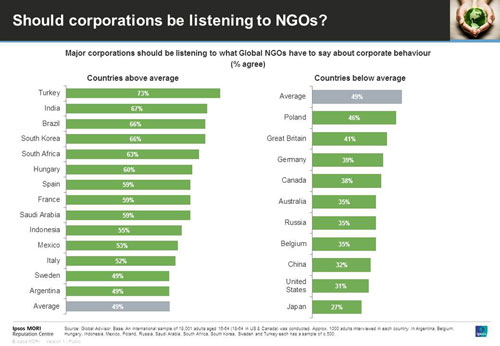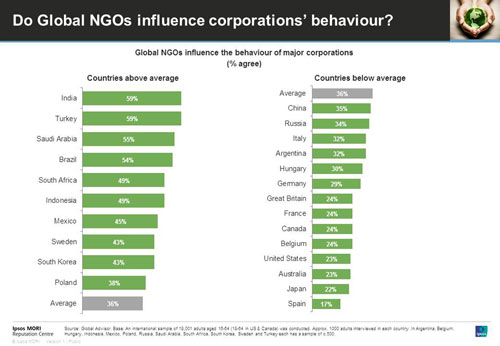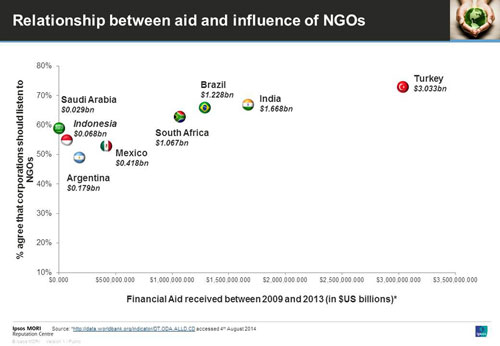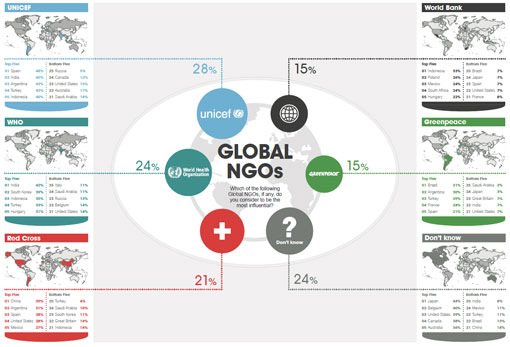The delicate relationship between the world's biggest NGOs and multinational corporations

Ipsos decided to run a global online survey to ask adults their views on the relationship between large corporations and global Non- Government Organisations (NGOs).
The opinions and actions of International NGOs, Charities, Think Tanks and Foundations are driving the CSR and sustainability agenda across the world. The opinions of these Global NGOs can directly shape how a company, and its activities, are perceived by the wider stakeholder community and the public, shape how an organisation’s sustainability strategy is received and directly influence their wider corporate reputation.
In light of these findings, Ipsos is also pleased to announce that we will be conducting a new Global NGO Survey, which intends to interview key individuals within the global NGO community, providing an independent review of the opinions of leaders and senior policy developers.One in two adults agrees that major corporations should be listening to global NGOs but are they?
 Figure 1: Chart showing level of agreement with the statement ‘major corporations should be listening to what Global NGOs have to say about corporate behaviour’ among countries
Figure 1: Chart showing level of agreement with the statement ‘major corporations should be listening to what Global NGOs have to say about corporate behaviour’ among countries
Around half (49%) of adults across 24 countries surveyed agree that ‘major corporations should be listening to what global NGOs have to say about corporate behaviour’ (fig. 1). The majority of countries place above the average (49%) and among 12 of the 24 countries surveyed, at least 50% of adults are in agreement that ‘major corporations should be listening to what global NGOs have to say about corporate behaviour’.
The extent to which corporations should be listening to NGOs does vary between countries with adults in Turkey more likely to agree than any other country. Nearly three in four (73%) adults in Turkey agree that major corporations should be listening to Global NGOs closely followed by around two thirds of adults in India (67%), Brazil (66%), South Korea (66%) and South Africa (63%). At the other end of the scale, adults in China (32%), the United States (31%) and Japan (27%) are least likely to agree with this statement implying a currently weak relationship between corporations and NGOs in these countries.
European countries are more divided on the matter - with those in Italy, Sweden, Spain, Hungary and France more likely to be in agreement than the country average (49%) and adults in Germany (39%), Great Britain (41%) and Belgium (35%) less convinced that major corporations should be listening to NGOs.
To what extent do NGOs influence behaviour of major corporations?
While the majority of countries rank above average in their agreement that corporations should listen to NGOs, far fewer countries believe that NGOs do in fact influence behaviour. 14 of the 24 countries surveyed rank below the country average when asked if ‘global NGOs influence the behaviour of major corporations'.
 Figure 2: Chart showing level of agreement with the statement ‘global NGOs influence the behaviour of major corporations’ among countries.
Figure 2: Chart showing level of agreement with the statement ‘global NGOs influence the behaviour of major corporations’ among countries.
Across all countries, one in three adults (36%) agree that global NGOs influence the behaviour of major corporations. This is compared to one in two (49%) who believe corporations should be listening to NGOs and suggests that large corporations aren’t living up to public expectations. There is a discrepancy between how the relationship between NGOs and corporations should function and how it does function in reality.
Encouragingly though for large corporations, four out of the top five countries that agree corporations should be listening to NGOs (India, Turkey, Brazil and South Africa), also rank within the top five who agree that NGOs do influence behaviour. South Korea, however, drops to 9th position with 43% in agreement with this statement (compared to 66% who think NGOs should be listened to).
The majority of European countries surveyed also appear to be more cynical regarding the influence of NGOs (with the exception of adults living in Turkey, Sweden and Poland) and are less likely to agree that ‘Global NGOs influence the behaviour of major corporations’ compared to the country average (36%).
Furthermore, all G7 countries - Canada, France, Germany, Italy, Japan, the United Kingdom and the United States - also position below the average (36%) when asked if Global NGOs influence major corporations’ behaviour; again emphasising that corporations are not living up to expectations in many countries.
The impact of financial aid on the influence of NGOs
One explanation for the higher proportion of adults in Turkey and India that agree NGOs should be listened to and have an influence on corporate behaviour may be linked to their receipt of financial aid. Between 2009 and 2013, Turkey and India received the most financial aid of all countries surveyed1 with Turkey receiving over $3 billion and India receiving over $1.5 billion.
 Figure 3: Chart showing relationship between influence of global NGOs and countries receiving Financial Aid
Figure 3: Chart showing relationship between influence of global NGOs and countries receiving Financial Aid
That is not to say that corporations in countries requiring no financial or developmental aid should make any less effort to improve their relationships with NGOs. One in two adults (49%) within 24 countries surveyed is in agreement that corporations should be listening to NGOs and acknowledges the influence NGOs should have on corporations. It would seem, however, that major corporations are failing to live up to expectations and closing their ears to them.
Infographic

About this Survey: The survey was conducted via Ipsos’ Global @dvisor in 24 countries around the world via Ipsos’ Online Panel system. An international sample of 18,001 adults aged 16-64 (18-64 in US & Canada) was interviewed. Approximately 1000 adults were interviewed in Australia, Canada, China, France, Germany, Great Britain, Hungary, India, Italy, Japan, Spain, the United States and approximately 500 adults were interviewed in Argentina, Belgium, Hungary, Indonesia, Mexico, Poland, Russia, Saudi Arabia, South Africa, South Korea, Sweden and Turkey. Fieldwork was conducted between 1st April and 15th April 2014. Weighting was applied to balance demographics and ensure that the sample’s composition reflects that of the adult population according to the most recent country Census data and to provide results intended to approximate the sample universe.



